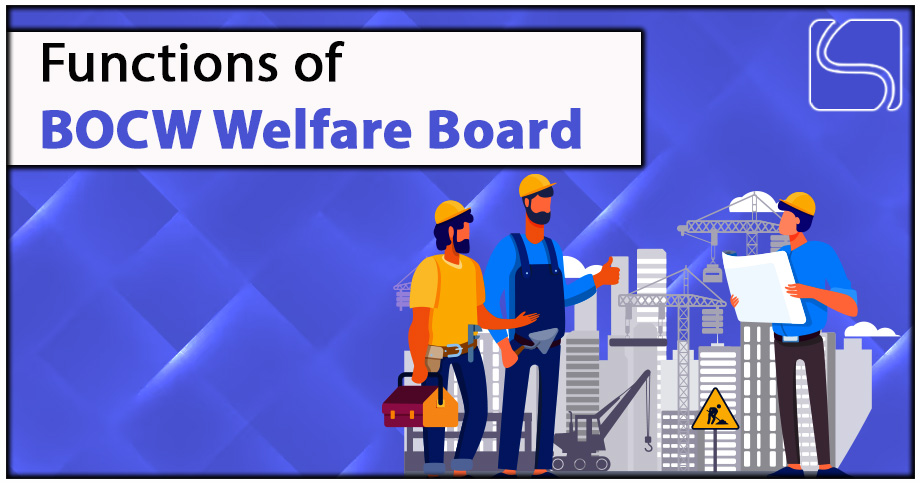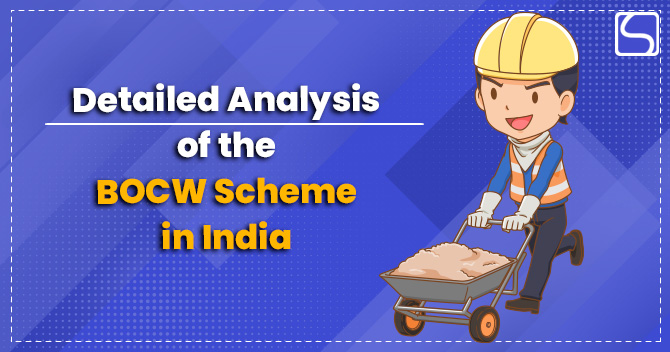What is the Concept and Calculation of BOCW Cess?

krishna kumar | Updated: Jul 05, 2022 | Category: BOCW
The Government of India has made it mandatory for every State government to constitute their Building and Other Construction Workers Welfare Boards. The BOCW Cess under the BOCW Act mentions a taxable amount paid by the registered proprietor against the project’s cost. The Government has ratified various provisions around BOCW Cess under the BOCW Cess Act, 1996 and Rules, 1998. Cess is payable at 1% on the cost of construction, which includes all expenditure incurred by an employer in connection with the building or other construction work, excluding (i) cost of land and (ii) any compensation paid or payable to a worker or his kin under the Employees Compensation Act 1923. This article will discuss the concept and calculation of BOCW cess in detail.
Table of Contents
The Slab Rate for BOCW Cess by the BOCW Act
A cess is levied and collected at 1% of the construction cost by the State Governments/UT Administrations under the Building and Other Construction Workers’ welfare cess, 1996[1].
When Should Employer Payout The BOCW Cess?
- The employer shall pay cess within 30 days of the finalisation of the project or within 30 days of the date on which assessment of cess is completed, whichever is earlier, to the cess collector.
- Suppose the project’s duration surpasses the one-year timeline. In that case, the employer shall pay the cess within 30 days of one year from the beginning of the project and every year after that at applicable rates on the project’s cost sustained until the completion of the project.
- Where the regional authority permission is compulsory for the construction work, every application for such permission shall be attached with a demand draft (DD) in favour of the Board for the amount at applicable rates.
- The advance cess payment is practicable for projects whose period is likely to surpass a one-year timeline. Standard enclosures need to be attached for advance cess payment, including;
- Notice of the project’s commencement according to the Section 46
- Demand draft enclosing the cess amount in approval of the respective Board.
- Advance cess pay by the employer under Sub-rules 3, 4, & 5 shall be adjusted by the assessment order(AO) during the final adjustment.
details to be provided by the employer in the Form-1
- The registration number issued by the BOCW Act
- Name and address of the establishment
- Number of workers employed
- Date of commencement of the project
- The estimated cost of the project
- Details of payment of cess
Provisions around the Concept and calculation of BOCW Cess
Every employer must file Form-1 under the Cess Rules with the assessment order within 30 days of the commencement of the project of payment of cess. Upon receiving the said Form, the AO will initiate the vetting procedure of the same;
- Employer
- Board
- Cess collector
The assessment order usually encloses the following details:
- Amount of cess due
- Cess already withdrew at source or paid
- Balance amount payable
- The due date for paying the cess fees
Note: the employer is liable to reply to the assessment order within the prescribed timeframe to avert any chances of re-estimation.
Points To Summarise Regarding BOCW Cess
- The estimate of BOCW Cess should be based on the overall construction payment addressed by the registered employers.
- The factors like labour’s wages and land cost are not considered for BOCW cess estimation.
- BOCW Act has allocated the responsibility of cess estimation to the official known as Accessing officer. Such officials have the right to enter the finances of the registered employer to calculate the exact cess amount.
- Can resolve any dispute relating to cess estimation or discharge at Appellate Authority constituted under the BOCW Act. To engage in the hearing process, the resentful employer must file an appeal and an authorised fee with the Appellate Authority.
- In case of postponed payment, the interest amounting to two percent of the overall cess amount shall be imposed on the employer.
- In case of intentional cess evasion, may subject the defaulter to a penalty of Rs. 1000 or imprisonment for the term of six months or both. The same is also true of the falsification of data for cess discharge.
- The penalties for alleged fraud or cess evasion shall apply to everyone in cases where the defaulting party is a company.
- The decision made by the Appellate Authority shall remain unchallenged in any Court of Law.
- Central Government reserves the exclusive authority for amending cess-related provisions under the BOCW Act. The Central Government, via Gazette Notification, shall share every amendment made publically.
- Under no circumstances such penalties would come to effect unless the defaulter gets a fair hearing before the Appellate authority.
- It is at the discretion of the Central Government to amend the provisions around the BOCW cess.
Penalties for Late or Non-Filing of BOCW Cess
- Interest payable on delay in payment of cess.—
Suppose an employer fails to pay any amount of cess payable under section 3 within the time specified in the assessment order. In that case, such employer shall be liable to pay interest on the amount to be paid at 2%. For each month or part of a month, contain the period from the date on which such payment is due till such amount is paid.
- Penalty for non-payment of cess within the described time.—
Any amount of cess payable by any employer under section 3 is not paid within the date specified in the order of assessment made under section 5 shall be deemed in arrears. The authority stipulates on this behalf may, after making such inquiry as it deems fit, force on such employer a penalty not exceeding the amount of cess: Provided that, before imposing any such penalty, such employer shall be given a reasonable opportunity of being heard and if after such hearing the said department is satisfied that the default was for any good and sufficient reason, shall impose no penalty under this section.
Conclusion
BOCW Act enforces stringent penalties for avoidance or late filing of BOCW cess. The property cost and wages paid to the workers are not considered for estimating the cess amount. The net project cost is the only basis of cess approximation.














